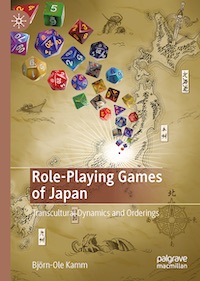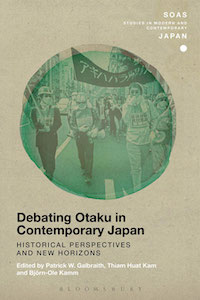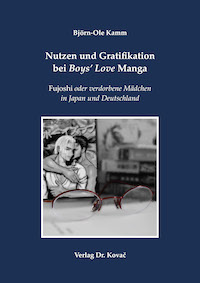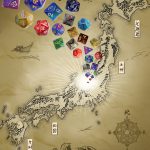Research
My research oscillates between Japanes Studies and a social scientist approach to Media Research. Shaping influences for my own mulitdisciplinary research approach were interactionist and material semiotic perspectives. Qualitative/quantitative and other polarizing dichotomies I leave behind in favor of appropriateness of the methods in regard to the research question at hand.
The basis for my research is the quest to look behind “common sense:“ On the one hand, “naturalized” categories within the academic discourse have to be questioned – like those you encounter in the recent discussions on Japanese popular culture. On the other hand, sociological research should leave the desk(top) behind and go out there, where the people are. That is way I favor qualitative interviews, network analysis, and participant observation for my research questions.
My Ph.D. thesis on global networks, identity formation and internet communities through the example of roleplayers in Japan, Germany, and the US was funded via a research scholarship from the German Institute for Japanese Studies (DIJ), and a scholarship from the Friedrich-Ebert-Foundation (FES). From April 2011 to early 2015 I had the opportunity to conduct my research at the Cluster of Excellence “Asia and Europe in a Global Context” (Heidelberg) and was also stationed at the Global Center of Excellence for “Reconstruction of the Intimate and Public Spheres in 21st Century Asia” of Kyoto University in 2012 to do additional inquiries for my project in Japan.
From 2015 to 2017 as senior lecturer, since then as junior associate professor at the Graduate School of Letters of Kyoto University, I continue my research and teaching in the fields of transcultural studies and role-playing studies.
List of publications is available here, or see below.
Monographs and Edited Volumes

Role-Playing Games of Japan
Transcultural Dynamics and Orderings
Monograph about non-digital role-playing games—such as table-top RPGs and live-action role-plays—in and from Japan, their possibilities and fluidities in a global context.
Palgrave, 2020.

Debating Otaku in Contemporary Japan
Historical Perspectives and New Horizons
Edited volume on the ‘otaku’ discourse in Japan, including original contributions translated into English for the first time. Co-Editors: Patrick W. Galbraith, Thiam Huat Kam.
Bloomsbury, 2015.

Uses & Gratifications of Boys’ Love Manga
Fujoshi or Rotten Girls in Japan and Germany
Monograph based on an empirical study of the boys’ love phenomenon including interviews in Japan and Germany.
Kovac, 2010.
Journal and Book Articles
2023. “Reenacting Japan’s Past That Never Was: The Ninja in Tourism and Larp.” In Vanessa Agnew, Juliane Tomann, and Sabine Stach, Reenactment Case Studies: Global Perspectives on Experiential History. New York: Routledge, 146–70. 10.4324/9780429445668-10.
2022. “Methodological Concerns of Researching Larp and Educational Roleplay in Japan: The (Im) Possibilities of Remote Fieldwork.” In Araki Hiroshi et al. (eds.), Global Japanese Studies after/with COVID-19: Reports from Europe. International Research Center for Japanese Studies, 201-219.
2021. “負けるためのプレイ・盛り立てるプレイ――LARPでの共同創造的なストーリーテリング [Play to Lose, Play to Lift – Co-creative Storytelling in Larp]. In Ōtsuka Eiji, 運動としての大衆文化 [Popular Culture as Movement]. Tokyo: Suiseisha, 313–332.
2021. “日本で広がる体験型ゲームLARP [LARP, an Experience-type Game, is Spreading in Japan].” In Okamoto Takeshi, Matsui Hiroshi, Matsumoto Kentarō (eds.), Yururepo. Kyoto: Jimbun Shoin, 108-111.
2019. “A Short History of Table-Talk and Live-Action Role-Playing in Japan: Replays and the Horror Genre as Drivers of Popularity.” Simulation & Gaming 50 (5): 621-44. [peer-review]
2019. “ライブ・アクション・ロールプレイ(LARP)という意識向上を目的としたシリアス・ゲーミング方法:「ひきこもり」についてのLARPを例に” [Live-Action Role-Play (Larp) as a Serious Gaming Tool for Awareness Raising: The Case of hikikomori (Acute Social Withdrawal)]. Japanese Journal of Occupational Science 13 (1): 32-44. [peer-review]
2019. “Memento Mori: Die Großen Alten in Japan” [Memento Mori: The Great Old Ones in Japan]. In Rafael Bienia, LARPokalypse. Braunschweig, Zauberfeder: 37-63.
2019. “Adapting Live-Action Role-Play in Japan: How ‘German’ Roots Do Not Destine ‘Japanese’ Routes.” Replaying Japan 1: 64-78. [peer-review]
2019. “’Nordic Larp’ 入門:芸術・政治的な教育LARPの理論と実践” [Introduction to ‘Nordic Larp:’ Theory and Practice of Artistic, Political, and Educational Larps]. JARPS(0): 5-14. [peer-review]
2019. “Experience Design for Understanding Social Withdrawal: Employing a Live-Action Role-Play (LARP) to Learn About and Empathize with Hikikomori in Japan.” In Neo-Simulation and Gaming toward Active Learning, edited by Ryoju Hamada, et al. Singapore, Springer: 387-396.
2017. “Brokers of ‘Japaneseness:’ Bringing table-top J-RPGs to the ‘West’.” Mutual Images Journal (2): 44-81. [peer-review]
2017. “Translating Research into Larp: Village, Shelter, Comfort.” In Rafael Bienia, Gerke Schlickmann, LARP: Silberhochzeit. Braunschweig, Zauberfeder: 31-60.
2017. “芸術•政治的な教育ラープ(LARP)と’ブリード’” [Artistic, Political Edu-Larp and ‘Bleed’]. In Idō Masami, Yamada Jun (eds.), 社会システムゲーミング [Society-System Gaming]. Tokyo, JASAG: 32-40.
2016. w/Becker, Julia. “Live-Action Roleplay; or the Performance of Realities.” In Toshiyuki Kaneda, Hidehiko Kanegae, et al. (eds.), Simulation and Gaming in the Network Society. Singapore: Springer: 35-51.
2016. “Cross-Gender Table-Talk-RPG auf Japanisch; oder, die beiläufigen Realitäten des Tischrollenspiels” [Cross-Gender Table-Talk-RPG in Japanese; or, the Collateral Realities of Table-Top Roleplaying]. In: Michiko Mae, Elsibaeth Scherer, Katharina Hülsmann (eds.), Japanische Populärkultur und Gender. Wiesbaden, VS: 273-303.
2015. “Die Kraft von nur 100 Yen: Larp in Japan“ [The Power of just 100 Yen: Larp in Japan]. In Rafel Bienia, Gerke Schlickmann, LARP: Zeug. Braunschweig, Zauberfeder: 17-32.
2013. “’Rotten’ Use Patterns: What Entertainment Theories Can Do for the Study of Boys’ Love.” In “Transnational Boys’ Love Fan Studies,” Transformative Works and Cultures (12). [peer-review]
2013. “Ethics of Internet-based Research on Japanese Subcultures.” In Asato, Wako and Yoko Sakai, Social Innovation and Sustainability for the Future. Kyoto, Nakanishi, pp. 525-540.
2012. “Vielfältig und Hybrid – Der Manga-Diskurs in Japan” [Diverse and Hybrid – The Manga Discourse in Japan]. In: JuLit 1/12 “Comic – Manga – Graphic Novel. Aktuelle Tendenzen in der graphischen Literatur für Kinder & Jugendliche:” 35-40.
2011. “Why Japan does not Larp.” In: Thomas Duus Henriksen, et al. Think larp. Academic Writings from KP2011. Kopenhagen: Rollespilsakademiet, pp. 52-69.
2008. “Mediale Kultivierungseffekte: Der Gay-Boom der 1990er Jahre in Japan” [Media Cultivation: Japan’s Gay Boom of the 90s]. In: Bochumer Jahrbuch zur Ostasienforschung (BJOAF), Vol. 32: 95-114.
Reviews
2019. “The End of Cool Japan: Ethical, Legal, and Cultural Challenges to Japanese Popular Culture ed. by Mark McLelland.” The Journal of Japanese Studies 45 (1): 129–134.
2019. “Atari to Zelda: Japan’s Videogames in Global Context by Mia Consalvo.” Social Science Japan Journal 22 (2): 335-338.
Presentations
- MIRA 2021: Keynote on Medievalism and Larp

- Ropecon 2021: Academic Keynote on RPGs of Japan

- Ropecon 2021: Educational Ninja Larp

- (Im) Possibilities of Remote Fieldwork

- Teaching Transcultural Studies: Talk at National Chung-Hsing University Taiwan

- Emotional and Psychological Safety

- TRPG Festival 2019

- DiGRA 2019 & Replaying Japan 2019

- Asymmetric Flows of Analog Gaming between Japan and Germany

- Larp Run and RPG Panel

- Live-Action Role-Play and Japan

- Experience Design for Understanding Social Withdrawal

- Artistic, Political Edu-Larp and “Bleed”

- Educational and Therapeutic Role-Playing in Japan

- Hikikomori Support and LARP

- The Power of 100 Yen – Larp in Japan

